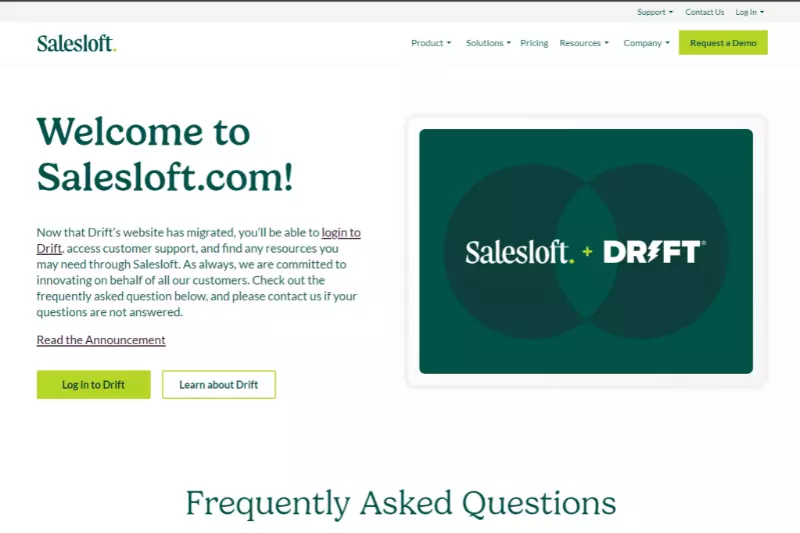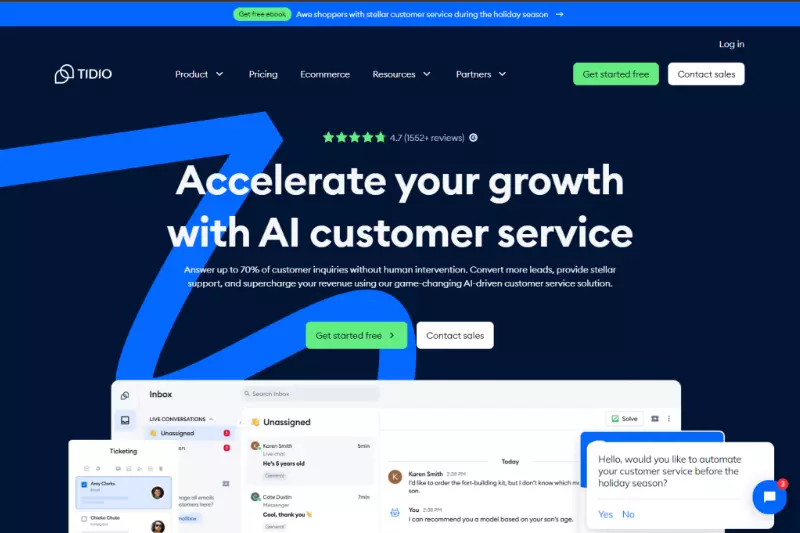Customer support tools are essential for businesses aiming to provide exceptional service and engagement with their audience. Intercom has long been a popular choice in this space, offering a range of features designed to streamline communication between businesses and customers. Whether it's due to cost, limitations in functionality, or the need for more specialized tools, many businesses are seeking alternatives that better align with their specific goals.
This blog will introduce you to the top Intercom alternatives available in 2025. We will explore a variety of options that cater to different aspects of customer support, including live chat, automated bots, and helpdesk solutions. Each tool is presented with its own set of benefits, designed to enhance customer engagement, improve team productivity, and offer flexibility at a competitive price.
Whether you're a startup looking for a cost-effective solution or an established business needing more customization, this guide will help you navigate the options. By understanding the unique benefits of each tool, you'll be able to choose the one that will improve your customer experience and streamline your support operations. We've gathered top examples that go beyond just replacing Intercom, offering valuable features and enhanced usability for businesses in various industries.
Top 10 Examples Of Intercom Alternatives
Choosing the right customer support platform is critical for enhancing your business's efficiency and customer experience. Intercom has served as a powerful tool, but it may not suit every business's needs. Many alternatives offer specialized features at different price points, making it essential to explore the best options before making a decision. These alternatives often provide better value and flexibility, enabling businesses to engage with customers in more dynamic ways.
In this section, we'll explore 10 of the best Intercom alternatives, each offering unique features to meet a range of customer support needs. These alternatives cater to various business sizes and use cases, ensuring that every organization can find the right fit for their customer engagement strategy.
Copilot.Live

Copilot.Live is a great alternative for businesses looking for personalized customer service solutions. It provides real-time customer interaction with AI-powered chatbots and automated workflows. With a seamless integration process, it helps businesses enhance communication, streamline customer support, and improve team collaboration. The platform supports multi-channel communication, including live chat, email, and social media, ensuring businesses can engage with customers wherever they are.
HelpCrunch

HelpCrunch is a robust customer support platform offering live chat, email, and help desk tools. Its user-friendly interface allows teams to efficiently manage customer inquiries. The platform's automation features, like triggered messages and personalized responses, ensure timely and relevant support. HelpCrunch also excels in providing a knowledge base to empower customers to find answers on their own. With built-in CRM tools, businesses can keep track of customer interactions and manage leads more effectively.
Zendesk

Zendesk is a widely recognized customer service platform that offers a comprehensive suite of tools to manage customer interactions. It includes live chat, email support, and ticketing systems, all under one roof. Zendesk's easy-to-use interface and integrations with various third-party apps make it a versatile tool for businesses of all sizes. The platform's powerful reporting tools enable businesses to gain insights into customer trends and improve service strategies.
Drift

Drift is a customer messaging platform designed to boost sales and customer service through personalized live chats. It excels at real-time communication with prospects and customers, providing instant responses and connecting them with the right team members. Drift's chatbot feature automates many processes, handling simple queries and freeing up human agents for more complex interactions.
Tidio

Tidio is a live chat and chatbot platform that allows businesses to engage with customers instantly. It integrates seamlessly with websites, providing a smooth customer experience with minimal effort. Tidio's AI-powered chatbots can answer common questions, collect leads, and even schedule appointments. The platform offers multi-channel support, including Facebook Messenger and email, ensuring that businesses can stay connected with customers across platforms.
Olark

Olark is a live chat software known for its simple yet effective features. It allows businesses to engage with customers directly via live chat on their websites. Olark's real-time chat system is backed by detailed analytics, helping businesses understand customer needs and improve service. The platform's automation tools, like targeted messages and visitor tracking, make it easy for businesses to engage customers at the right time.
HubSpot

HubSpot is a leading customer support platform known for its comprehensive suite of tools. It integrates live chat, helpdesk software, email tracking, and CRM capabilities into one platform. The software's user-friendly interface and automated workflows streamline customer service, allowing teams to respond quickly and efficiently. HubSpot's powerful CRM helps track customer interactions across multiple channels, enabling businesses to personalize support. The platform's free plan offers an accessible entry point for small businesses.
Crisp
.webp)
Crisp is an easy-to-use multi-channel customer support tool that allows businesses to engage customers via live chat, email, and even social media platforms like Facebook Messenger. It offers a shared inbox to manage all customer communications in one place, ensuring that businesses never miss an important message. Crisp also comes with a built-in knowledge base, allowing customers to help themselves with FAQs.
Front

Front is a collaborative inbox that brings together email, live chat, and social messaging in one platform. It focuses on team collaboration by allowing multiple team members to reply to customer inquiries from a shared inbox. Front's unique feature is its ability to assign messages to specific team members, track progress, and resolve queries in real time. The platform offers automation tools, helping businesses scale their support while maintaining a personalized experience.
Help Scout
.webp)
Help Scout is a simple yet powerful customer support platform designed to provide a seamless experience for both teams and customers. With its shared inbox, Help Scout enables teams to collaborate on customer issues, ensuring timely and effective responses. It offers a wide range of tools, including knowledge bases, automated workflows, and reporting capabilities. Help Scout also integrates with numerous third-party applications, making it highly customizable for different business needs.
Use Cases Of Intercom Alternatives
.webp)
Selecting an appropriate customer support tool depends on the specific use cases your business needs to address. Different alternatives to Intercom cater to various aspects of customer service, from automating interactions to enhancing real-time communication. In this section, we'll discuss some common use cases that Intercom alternatives can effectively support. Understanding these use cases will help you choose the best platform based on your business's customer engagement goals.
These use cases cover everything from improving team collaboration to automating responses, ensuring that businesses can provide better customer support and boost efficiency.
Support client en temps réel
Real-time customer support is crucial for businesses that prioritize instant communication with their customers. This use case involves platforms that allow businesses to connect with customers via live chat, providing immediate assistance for queries. Real-time support helps increase customer satisfaction by resolving issues on the spot, reducing frustration. This use case is especially valuable for businesses in fast-paced industries, such as e-commerce.
Service client automatisé
Automated customer service is an efficient solution for businesses looking to streamline their support process. This use case includes the use of AI-driven chatbots that automatically respond to frequently asked questions, collect customer details, and offer initial troubleshooting help. Automation frees up customer service agents to focus on more complex inquiries, improving overall productivity. It is especially useful for businesses with high volumes of repetitive queries, such as tech support.
Génération et qualification de leads
Lead generation and qualification use cases are designed to help businesses convert website visitors into potential customers. By using automated chatbots or live chat, businesses can engage visitors in real-time, qualify leads based on their needs, and guide them through the sales funnel. This process allows businesses to focus their efforts on high-potential prospects while nurturing relationships with interested visitors.
Multi-Channel Customer Engagement
Multi-channel customer engagement enables businesses to connect with customers across different platforms, including websites, social media, and email. This use case ensures that no matter how or where customers reach out, they can receive consistent and seamless support. By providing a unified approach to managing communications, businesses can improve response times and offer more personalized service. This use case is vital for companies that maintain a presence across multiple channels.
Customer Feedback And Surveys
Customer feedback and surveys are essential for businesses that want to measure customer satisfaction and improve their services. This use case involves collecting feedback from customers through automated surveys or real-time conversations, helping businesses gauge how well they are meeting customer expectations. Gathering feedback also enables businesses to identify areas of improvement, leading to better customer experiences.
Knowledge Base And Self-Service
The knowledge base and self-service use case revolves around empowering customers to find solutions on their own. By providing a comprehensive library of articles, guides, and FAQs, businesses allow customers to resolve issues without needing to contact support. This use case helps reduce the workload on support teams while improving the customer experience by providing 24/7 access to solutions.
Team Collaboration And Communication
The team collaboration and communication use case focuses on improving internal efficiency by allowing customer support teams to work together seamlessly. This involves shared inboxes, message tagging, and assigning conversations to specific agents based on expertise. It ensures that teams can collaborate on complex customer issues without confusion or miscommunication. This use case is especially important for businesses that handle high volumes of support requests and need to maintain consistency.
Support client proactif
Proactive customer support involves reaching out to customers before they encounter issues. This use case includes tools that allow businesses to monitor customer behavior in real-time, such as abandoned carts or website interactions, and then trigger personalized messages or assistance. Proactive support aims to prevent problems from escalating by offering help at the right moment.
Interaction client personnalisée
Personalized customer interaction is key to making customers feel valued and understood. This use case leverages customer data, including previous interactions, preferences, and purchase history, to tailor communication and support. With personalization, businesses can offer relevant solutions and anticipate customer needs, leading to stronger relationships. This approach is especially useful for businesses with a diverse customer base, like retail or online services, where providing individualized experiences can help enhance loyalty and drive sales.
Analytics And Reporting For Support Improvement
Analytics and reporting use cases are focused on improving the quality and efficiency of customer service operations. By analyzing customer support interactions, businesses can identify patterns, measure performance, and make data-driven decisions. These insights can help optimize staffing, identify recurring issues, and improve response times. This use case is crucial for businesses that aim to continually improve their customer support operations and provide better services.
Benefits of Intercom Alternatives
.webp)
Intercom alternatives provide a range of benefits to businesses seeking efficient customer support solutions. From enhancing response times to improving team collaboration, these tools are designed to meet diverse customer engagement needs. By leveraging the right platform, businesses can ensure they provide timely, personalized, and effective support, ultimately leading to greater customer satisfaction and loyalty.
In this section, we'll explore the key benefits that Intercom alternatives offer, allowing businesses to choose the right platform to improve their overall customer service strategy.
Improved Response Times
One of the most significant benefits of using Intercom alternatives is the improvement in response times. With real-time chat features and AI-powered automation, businesses can provide instant support to customers, reducing wait times for inquiries and issues. This quick response not only helps resolve customer concerns faster but also enhances the customer experience, increasing satisfaction and building stronger customer relationships.
Cost-Effective Customer Support
Another benefit of using alternatives to Intercom is the ability to provide cost-effective customer support. Many of these platforms offer scalable pricing options, allowing businesses of all sizes to manage support without overspending. Automation tools, such as chatbots and predefined response templates, help reduce the need for extensive human resources while maintaining quality support. This cost-saving advantage is particularly valuable for small businesses or startups looking to optimize their support operations.
Engagement client amélioré
Alternatives to Intercom can significantly boost customer engagement. By offering multiple channels for communication, such as live chat, social media messaging, and email, businesses can interact with customers through their preferred medium. Personalized and timely communication helps businesses foster better relationships with their customers. Engaged customers are more likely to return, recommend services, and make repeat purchases. This is crucial for businesses aiming to build long-term customer loyalty and maintain competitive advantage.
Increased Automation And Efficiency
The use of automation tools in Intercom alternatives greatly enhances the efficiency of customer support teams. With AI-driven bots and automated workflows, businesses can manage a higher volume of customer interactions without compromising on quality. Automation handles repetitive tasks such as answering common queries, ticket routing, and data collection, allowing customer support agents to focus on more complex issues. This increased efficiency helps reduce workload and improve response times.
Improved Reporting And Analytics
Effective reporting and analytics are key benefits provided by many Intercom alternatives. These platforms offer in-depth insights into customer interactions, agent performance, and overall support efficiency. Businesses can track key metrics, such as response times, customer satisfaction, and resolution rates, to identify areas for improvement. By analyzing these data points, businesses can make informed decisions, optimize workflows, and enhance the quality of customer service.
Better Integration With Other Tools
Intercom alternatives often offer seamless integration with various other tools, allowing businesses to create a unified support ecosystem. Integration with CRM systems, marketing platforms, and e-commerce software enables businesses to provide more personalized and effective customer support. For example, customer support agents can access customer history directly within the chat interface, improving the efficiency of each interaction.
Scalability For Growing Businesses
Scalability is a key benefit offered by many Intercom alternatives. These platforms are designed to grow your business, allowing you to adjust the number of users, features, or support channels as needed. Whether you're handling a few customer interactions or a large volume, you can scale your operations smoothly. This flexibility ensures that businesses, no matter their size, can continue to deliver excellent customer support as they expand.
Increased Customer Retention
By improving customer service and engagement, Intercom alternatives can help increase customer retention. Timely responses, personalized support, and proactive communication make customers feel valued and supported. Satisfied customers are more likely to return, and businesses that build strong relationships with their customers can foster loyalty. Increased customer retention translates into repeat business, higher lifetime value, and reduced churn.
Expérience utilisateur personnalisable
Customization is another significant benefit of using Intercom alternatives. Many platforms allow businesses to tailor the user experience to better fit their brand identity and customer needs. From designing personalized chat windows to configuring automated responses, businesses can ensure that their support system reflects their voice and style. Customization also enables businesses to address specific customer needs more effectively.
Omnichannel Support
Omnichannel support is a major benefit provided by many alternatives to Intercom. With omnichannel capabilities, businesses can engage with customers across multiple platforms, be it through live chat, social media, email, or mobile apps. This seamless communication ensures that customers can reach out for support through their preferred channels, enhancing their experience. Omnichannel support also allows businesses to track interactions across channels, ensuring that customers receive consistent service.
Better Knowledge Management
A key benefit of some Intercom alternatives is the ability to manage and access customer knowledge more effectively. By maintaining a centralized knowledge base, businesses can provide both customers and agents with easy access to troubleshooting guides, FAQs, and other helpful resources. This makes it easier for customers to find solutions independently and reduces the workload on support teams. It is particularly valuable for industries that rely on complex products or services.
Conclusion
Intercom alternatives offer a wide range of benefits that can significantly enhance customer support operations, from improved response times and cost-effectiveness to better team collaboration and automation; these platforms provide businesses with the tools needed to deliver exceptional service. Whether you're looking for scalability, personalized interactions, or omnichannel support, exploring these alternatives can help optimize customer experiences and boost overall satisfaction. By selecting the right solution, businesses can meet evolving customer needs and drive long-term success.


















